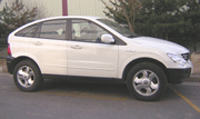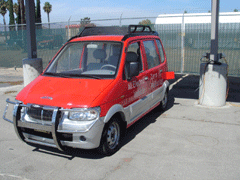Driving Electric
Air Date: Week of December 15, 2006

Phoenix Production Sport Utility Truck (SUT). (Phoenix Motorcars)
The electric car may not be dead. A number of small startup companies are launching a new generation of electric vehicles. Living on Earth’s Ingrid Lobet reports that one company called Phoenix Motorcars will soon be offering an electric pickup truck and an SUV that use a unique type of battery.
Transcript
GELLERMAN: When General Motors, Toyota, and Ford decided to pull the plug on their electric vehicles, it seemed to toll a death knell for cars powered by batteries.But there’s still a charge left in the fledgling technology. Today, there are a number of small startups trying to resurrect the electric vehicle, though most of the models are just for city-driving or very expensive. But as Living on Earth’s Ingrid Lobet reports, there is one car company, called Phoenix Motorcars, that is rising above the others, with plans to sell long-range, relatively affordable electric vehicles - in the coming year a pickup truck, and an SUV in 2008.
[BUZZING SOUND]
LOBET: In a building on the outskirts of Los Angeles, engineers test and tweak Phoenix Motorcars' first run of electric sports utility trucks. Salesman Brian Bliss points out the slanty headlights framing a V-shaped black grill.
.gif)
Phoenix Production Sport Utility Truck (SUT). (Phoenix Motorcars)
LOBET: Most electric cars - though not all - have been small, like pumped up golf carts, or sporty two-seaters, but both Phoenix models can fit 5 passengers plus cargo.
BLISS: These are full size cars, comparable to any gas powered vehicle you'll see on the road today.
LOBET: Phoenix thinks it can offer a bigger car because it's using a new battery. It gets its batteries from a chemicals firm in Reno, Nevada - Altairnano. The company discovered a battery chemistry that solves the not-so-little problem of lithium batteries getting too hot and bursting into flames - like the laptop batteries recently in the news. Phoenix CEO Dan Elliot:
ELLIOT: The lithium titanate, or nano-safe battery, removes the carbon content from the battery, it takes the graphite out, and by doing that, it cannot, because of its physical chemistry, get into a thermal runaway issue, so you can’t actually have that tremendous heat up and then a fire like you see in a standard lithium battery.

Phoenix Production Sport Utility Vehicle (SUV).(Phoenix Motorcars)
HOUSE: You can take the energy out very quickly and you can put it back in very quickly and the life does not degrade. It's a quantum leap, it's a paradigm-shifting leap.

A Miles OR70 demonstrates its zero pollution capability by charging at a solar panel array at MCB Camp Pendleton. (Photo: Miles Automotive Group)
LOBET: Phoenix is starting to get the kind of celebrity attention that startups can only dream of and that helped launch the Toyota Prius a few years ago. Here actor Ed Begley praises the Phoenix-Altairnano combo at a clean vehicle show on the Santa Monica Pier.
BEGLEY: We have been waiting for the breakthrough batteries and I believe it's happened with these wonderful lithium ion batteries that do no have the graphite in them, it's totally different they don't have the heat issues of lithium ion batteries have had. I think we've found the Holy Grail of batteries.
LOBET: But Phoenix is still ironing out the kinks. Mechanics worked down to the wire to have one SUV ready for reporters to test-drive. They worked so long they had to leave the shop without charging it, so they brought along their mobile charger. But it turns out bringing a diesel generator onto the Santa Monica pier for a clean car event is a no-no.
The idea of a new electric car and this new battery technology does have its skeptics. Marshall Miller, Senior Development Engineer at UC Davis' Institute for Transportation Studies is one.
MILLER: Lithium Ion batteries have been around for a while and we have tested them in our labs for at least five years now, and the properties of the batteries, with the exception of cycle life, have not changed significantly. The real problem has been the cost, and potentially, the cycle life. The big question is, as you bring the price down, how low can you get it? Is that price low enough to be mass marketable? And I think that’s something that no one really knows at this point.
LOBET: Phoenix is selling its trucks and SUV’s for 45 thousand dollars, which will still be a loss for the company in the beginning. Another question is whether Americans, just catching on to hybrids, will want to buy an all battery car, even if it can go as long on a charge as a car goes on a tank of gas, because then you’d have to recharge. But Phoenix foresees a day when you can go to the gas station for either a fill-up or a charge up, and either would take the same time. Altairnano Senior VP Roy Graham says major automakers are showing interest.
[CROWD ON A PIER]
GRAHAM: Given the technical characteristics of the batteries, all of the hybrid manufacturers and the plug-in hybrids and all the electric vehicle manufacturers are all over it, so you can assume that we’re talking to a lot of the major players as well.
LOBET: Phoenix Motorcars says it will deliver its first electric pickups in the spring. They'll be available to municipal and commercial fleets and go 100-130 miles on a charge. Consumers will be able to buy the trucks and SUV’s beginning in 2008. Those vehicles will have a double-battery pack and go twice as far.
For Living on Earth, I’m Ingrid Lobet.
Links
To read a longer interview with Dan Elliot, CEO, Phoenix Motorcars, click here.
To read a longer interview with Brian Bliss, Sales, Phoenix Motorcars, click here.
Living on Earth wants to hear from you!
Living on Earth
62 Calef Highway, Suite 212
Lee, NH 03861
Telephone: 617-287-4121
E-mail: comments@loe.org
Newsletter [Click here]
Donate to Living on Earth!
Living on Earth is an independent media program and relies entirely on contributions from listeners and institutions supporting public service. Please donate now to preserve an independent environmental voice.
NewsletterLiving on Earth offers a weekly delivery of the show's rundown to your mailbox. Sign up for our newsletter today!
 Sailors For The Sea: Be the change you want to sea.
Sailors For The Sea: Be the change you want to sea.
 The Grantham Foundation for the Protection of the Environment: Committed to protecting and improving the health of the global environment.
The Grantham Foundation for the Protection of the Environment: Committed to protecting and improving the health of the global environment.
 Contribute to Living on Earth and receive, as our gift to you, an archival print of one of Mark Seth Lender's extraordinary wildlife photographs. Follow the link to see Mark's current collection of photographs.
Contribute to Living on Earth and receive, as our gift to you, an archival print of one of Mark Seth Lender's extraordinary wildlife photographs. Follow the link to see Mark's current collection of photographs.
 Buy a signed copy of Mark Seth Lender's book Smeagull the Seagull & support Living on Earth
Buy a signed copy of Mark Seth Lender's book Smeagull the Seagull & support Living on Earth

